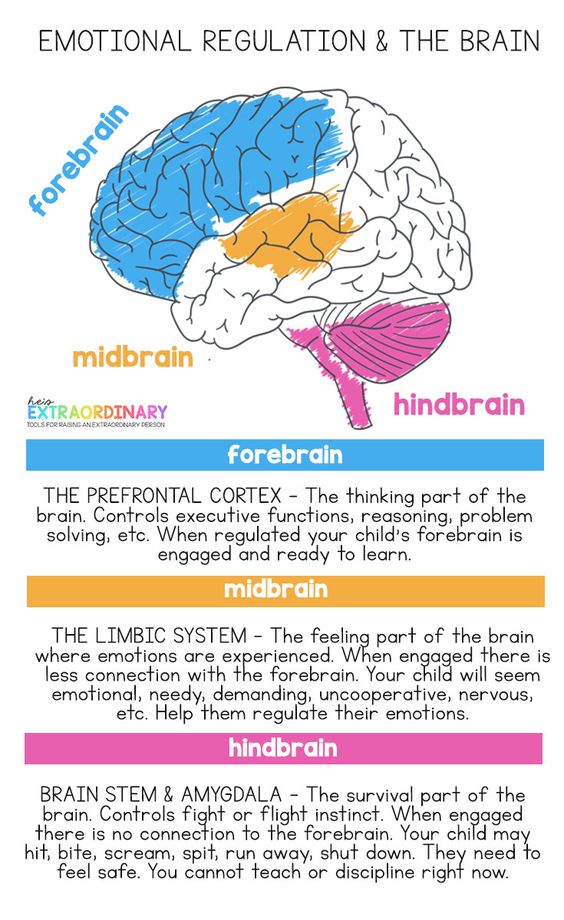Blog
Early Life Experiences and De-escalation strategies
Blog Entry: 7th December 2022

Mel and Jayne recently attended an interesting course which discussed Early Life Experiences and De-escalation strategies.
We thought this part of the training surrounding emotional regulation and the brain would be beneficial to share with you all.
"Three basic parts of the brain, identified in the 1960's by Dr. Paul McLean as the "Triune Brain", participate in the eruption and can aid in the reduction of challenging behaviours.
The Reptilian Brain, or hind brain, sits at the bottom of our brain at the brain stem. It is responsible for survival, including essential life functions that we don't even think about like the beating of the heart and breathing, as well as for flight, fight or freeze responses. Actions that arise from the reptilian brain are automatic; we don't think about or plan them. In normative child development, this part of the brain is well formed at birth.
The Limbic Brain, or the midbrain, wraps around the reptilian brain. It's main parts are the amygdala, the hippocampus and the hypothalamus. Here memories are recorded along with, importantly, the experience of the memory as positive or negative. It is responsible for most of our emotions, which are for the most part unconsciously produced.
The forebrain, or the Prefrontal Cortex (PFC), is at the front of the brain. This part of the brain develops the latest, and isn't fully formed until late adolescence. As it comes on line it is the game changer. It is responsible for acting, rather than reacting. Here, too, is where Executive Function skills stem. The ability to reason, imagine, problem solve and self regulate are all resources of the PFC.
Early childhood reactivity can be challenging. It is rooted in the adept and more developed lower reptile and limbic
brains and while they may seem unreasonable, diving deeper behind the behaviours usually reveals rational, though
not effective, reasons. They are ill-informed attempts of the survival drive of the lower brain to re-establish a sense
of safety. The goal is to help the lower brain feel safe, and convince it to give control back to the front brain."

Blog Archive
Nationwide Grant
(28th April 2025)Steve Anthony Visit to Playgroup
(28th February 2025)Sharing Resources
(28th February 2025)Sponsored Reading Event
(28th February 2025)Libary trip
(5th February 2025)The Black Nursery Manager Facebook Post
(3rd February 2025)Sharing for knowledge
(21st January 2025)Language style
(16th January 2025)Writing before young children's hands are ready
(9th December 2024)World Mental Health Day
(9th October 2024)Family Picnic Event with Marks Magic Mayhem
(21st July 2024)Family Picnic Event
(16th July 2024)Final Dinky Ponies Visit of this Academic Year
(26th June 2024)Woodwork Wednesday 'Wood Crackers'
(26th June 2024)Woodwork Wednesday 'Timber Champions'
(19th June 2024)Woodwork Wednesday 'Wood Tinkers'
(5th June 2024)Sponosored Walk Event
(23rd May 2024)Dinky Ponies Visit
(16th May 2024)Changes to the way playgroup operates
(16th April 2024)Being Healthy
(14th April 2024)Risky Play In Early Years
(14th April 2024)Sponsored Reading Event
(7th March 2024)Rocket Launch Failures
(5th March 2024)Supporting Children's Sleep
(26th February 2024)Schemas
(15th February 2024)Dinky Ponies
(5th February 2024)World Religion Day
(16th January 2024)Exploring paint
(11th January 2024)Library visit
(10th January 2024)Creative play
(15th October 2023)The benefits of play
(12th October 2023)Kate Claxton Author visit
(9th October 2023)Easy Fundraising
(20th September 2023)End of term
(24th July 2023)Family Picnic Event
(10th July 2023)Significant male- stay and play
(22nd June 2023)Dinky Ponies- Therapy Sessions
(11th June 2023)Healthy Eating
(18th May 2023)Life Cycles
(16th May 2023)Collaboration and working together
(2nd May 2023)A visit from Dorset and Wiltshire Fire Brigade
(26th April 2023)Libby Jackson- Author
(22nd March 2023)Bert's Books
(1st March 2023)World Book Day/Week
(28th February 2023)Sharing Books
(28th February 2023)Raising money through a sponsored read
(23rd February 2023)What do you know about schemas?
(20th February 2023)Children's Mental Health Week
(9th February 2023)Safer Internet Day
(7th February 2023)Swindon Stories
(27th January 2023)Woodwork at Playgroup
(24th January 2023)Water Wall and more!
(20th January 2023)Early Life Experiences and De-escalation strategies
(7th December 2022)Nursery Rhyme Week
(7th November 2022)Supporting Speech and Language Development
(17th October 2022)Forest School
(21st September 2022)Fun Run!
(14th July 2022)How adults think about risk
(26th June 2022)Finding Treasure
(16th June 2022)Memory Wall
(24th May 2022)Loving pedagogy and building attachments
(17th May 2022)50 year celebration event
(13th May 2022)Storytelling through pictures
(3rd May 2022)Setting the scene!
(31st March 2022)Block Play
(2nd March 2022)Tip of the Iceburg
(19th January 2022)Visits from the PCSO
(14th January 2022)Celebrating 50 years of Croft Playgroup
(11th January 2022)Happy Christmas
(16th December 2021)Confident readers
(1st December 2021)Fundraising- Wreath making class
(17th November 2021)Play and take risks quote
(1st November 2021)Introducing our Library room
(19th October 2021)When will my child write?
(7th October 2021)Did you know?
(9th September 2021)The start of a new year
(5th September 2021)End of another year
(22nd July 2021)The benefits of movement
(7th June 2021)Support not punishment
(6th June 2021)ZUMBA
(18th May 2021)Caterpillars to Chrysalises
(12th May 2021)People who inspire us!
(27th April 2021)World Book Day
(5th March 2021)Pre-Writing Skills
(24th February 2021)Sponsored read
(5th February 2021)Be kind to yourself
(12th January 2021)The end of 2020!
(18th December 2020)The power of water play.
(11th December 2020)Nanny's feedback and Settling in
(4th December 2020)Celebrations of the nations day- Diwali festival of light
(13th November 2020)Tales from the Sandpit
(2nd November 2020)The seasons are changing
(15th October 2020)The drive to play is a basic biological drive...
(6th October 2020)Mark Making is not just 'Scribbles!'
(28th September 2020)Tales from the Sandpit
(24th September 2020)Why does play matter?
(14th September 2020)Our light box
(10th September 2020)The art and creativity of balancing
(8th September 2020)Welcome back to Playgroup
(3rd September 2020)Longer opening hours
(3rd February 2020)Merry Christmas and a Happy New Year!
(19th December 2019)Rhythmic Movement
(19th December 2019)Playgroup Values
(28th November 2019)Welcome to our new online Blog
(22nd October 2019)

